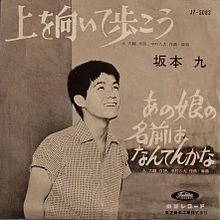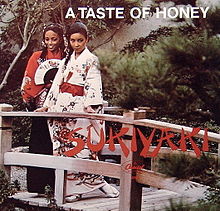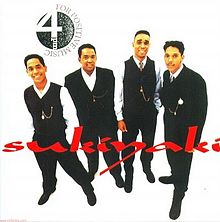- Sukiyaki (song)
-
"Ue o Muite Arukō (Sukiyaki)" 
Single by Kyu Sakamoto from the album Sukiyaki and Other Japanese Hits (US) B-side "Anoko No Namaewa Nantenkana" Released 1961 (Japan)
1963 (US, UK)Genre Pop Length 3:05 Label Toshiba-EMI (Japan)
Capitol/EMI Records (US)
HMV/EMI (UK)Writer(s) Rokusuke Ei (lyrics)
Hachidai Nakamura (music)Kyu Sakamoto singles chronology "Sukiyaki"
(1961)Music video "Ue o Muite Arukō" on YouTube "Ue o Muite Arukō" (上を向いて歩こう, literally "[I] shall walk looking up") is a Japanese-language song that was performed by Japanese crooner Kyu Sakamoto, and written by lyricist Rokusuke Ei and composer Hachidai Nakamura. It is best known under the alternative title "Sukiyaki" in English-speaking parts of the world. The song reached the top of the Billboard Hot 100 charts in the United States in 1963, and was the only Japanese-language song to do so. In total it sold over 13 million copies internationally.[1][2] The original Kyu Sakamoto recording also went to number eighteen on the R&B chart.[3] In addition, the single spent five weeks at number one on the Middle of the Road charts.[4] The recording was originally released in Japan by Toshiba in 1961. It topped the Popular Music Selling Record chart in the Japanese magazine Music Life for three months, and was ranked as the number one song of 1961 in Japan.
Well-known English-language cover versions include a 1981 cover under the title "Sukiyaki" by A Taste of Honey and a 1995 cover by 4 P.M.. There is also an English language version with altogether different lyrics by Jewel Akens under the title "My First Lonely Night" recorded in 1966. There are many other language versions of the song as well.
Contents
Lyrics
The lyrics tell the story of a man who looks up and whistles while he is walking so that his tears won't fall. The verses of the song describe his memories and feelings. The English-language lyrics of the version recorded by A Taste of Honey are not a translation of the original Japanese lyrics but a completely different set of lyrics set to the same basic melody.
The title Sukiyaki, a Japanese hot pot dish, has nothing to do with the lyrics or the meaning of the song; the word served the purpose only because it was short, catchy, recognizably Japanese, and more familiar to most English speakers. A Newsweek columnist noted that the re-titling was like issuing "Moon River" in Japan under the title "Beef Stew."[5]
Covers and variations
In 1963, the British record label Pye Records released an instrumental cover version of the song by Kenny Ball and his Jazzmen. They were concerned that English-speaking audiences might find the original title too difficult to remember/pronounce, so they gave it the new title of "Sukiyaki'". This title was retained when Capitol Records in the United States, and His Master's Voice (HMV) in the UK, released Kyu Sakamoto's original version a few months later. Sakamoto's follow-up to "Sukiyaki," "China Nights (Shina no Yoru)," charted in 1963 at number 58. That was the last song by an artist from Japan to reach the U.S. pop charts for 16 years, until the female duo Pink Lady had a top-40 hit in 1979 with its English-language song "Kiss in the Dark."
Several other artists have recorded cover versions of the song, while others have written and/or performed songs based on the melody:
- In 1963, Brazilian vocal music Trio Esperança, then child singers, released a cover of the song in Portuguese, called Olhando para o céu, on their debut album "Nós somos sucesso". The lyrics in Portuguese were written by Romeo Nunes.
- In 1963, Dutch band Blue Diamonds released a cover version.
- In 1963, The Ventures did a gentle instrumental cover of the song on its album release "Let's Go!"
- In 1963, Canadian singer Claude Valade recorded a French version, "Sous une pluie d'étoiles".
- In 1965, the Hong Kong-based band The Fabulous Echoes (later known as Society of Seven) recorded the song.
- In 1966, US soul singer Jewel Akens released the song as "My First Lonely Night" as part of his double A side single "Mama, Take Your Daughter Back"/"My First Lonely Night" on ERA records. This is probably the nearest translation to the original; although not a literal such, it tells a similar story of a lonely man walking through the night, after losing his love.
- In 1967, The Ginny Tiu Revue recorded this on their self-titled first album.
- Canadian singer Lucille Starr recorded a version of "Sukiyaki" that featured English-language lyrics.
- In 1975, the Hawaii-based Cecilio & Kapono recorded a markedly different English-language version in their album Elua released on Columbia Records.
- In 1981, a cover by A Taste of Honey reached Top 3 on U.S. Billboard Hot 100 chart.
- In 1983, Finnish singer Riki Sorsa recorded the song with original Japanese lyrics as "Sukiyaki (Ue O Muite Aruko)".
- In 1989, Selena recorded a Latin-influenced cover.
- In 1995, a version by 4 P.M. reached number 8 on the US Billboard Hot 100 charts.
- In 1995, a reggae version by Sayoko both in English and Japanese featuring Beanie Man.
- In 1995, Jackie And The Cedrics recorded a surf version, "Sukiyaki Stomp", as the "B" side of "Scalpin' Party", with "Justine" as the 3rd song on the 7" vinyl EP. They also performed the song as part of their live set, including when they appeared in NYC in 1999.
- In the 1990's BoyzIIMen redid the song in english in one of their albums.
- In 1996, Brazilian axé singer Daniela Mercury recorded "Sukiyaki" with its original Japanese-language lyrics. The song was released outside Brazil only, as an international bonus track on her 1996 studio album Feijão com Arroz.
- In 2000, solo violinist Diana Yukawa recorded "Sukiyaki" on her bestselling debut album (known as Elegy in the UK and La Campanella in Japan). Yukawa also performed "Sukiyaki" various times on the mountainside where her father, Akihisa Yukawa, died in the Japan Airlines Flight 123 crash with Sakamoto.
- In 2000, Big Daddy released a smooth retro version which appeared in their comp CD, "The Best of Big Daddy" (the song had originally appeared on the Japanese release of their 1991 album "Cutting Their Own Groove").
A Taste of Honey version
"Sukiyaki" 
Single by A Taste of Honey from the album Twice As Sweet Released 1981 Recorded 1981 Length 3:41 Label Capitol B-4953 Writer(s) Hachidai Nakamura
Janice Marie Johnson (English lyrics)A Taste of Honey singles chronology "Rescue Me"
(1980)"Sukiyaki"
(1981)"I'll Try Something New"
(1982)Music video "Sukiyaki" on YouTube The cover version by A Taste of Honey reached number three on the U.S. Billboard Hot 100 chart.[6] It also went to number 1 on Billboard's Adult Contemporary chart and Soul chart).[7]
A Taste of Honey version used English-language lyrics, written by A Taste of Honey group member Janice Marie Johnson, who was given permission by the original song's copyright holders to write the English-language lyrics on the understanding that she receive neither official credit nor remuneration.[citation needed] Johnson is quoted in The Billboard Book of Number One R&B Hits by Fred Bronson as saying that when she translated the original Japanese lyrics into English, she found out that the lyrics could be interpreted in three ways: as a man on his way to his execution, as someone trying to be optimistic despite life's trials, or as the story of an ended love affair. "Me being the hopeless romantic that I am," she explained, "I decided to write about a love gone bad."[citation needed]
A Taste Of Honey's version of "Sukiyaki" first appeared on their 1980 album "Twice As Sweet". It was released as a single in 1981.
This version is often (incorrectly) associated with Japanese pop singer Hikaru Utada.
Chart (1981) Peak
positionBillboard Soul Chart 1 Billboard Adult Contemporary 1 Billboard Hot 100 Chart 3 4 P.M. version
"Sukiyaki" 
Single by 4 P.M. from the album Now's the Time Released 1995 Format CD and cassette single Recorded 1995 Length 2:42 Label London Records (UK) Writer(s) Hachidai Nakamura
Janice Marie Johnson (English lyrics)4 P.M. singles chronology "Sukiyaki"
(1995)"Lay Down Your Love"
(1995)Music video "Sukiyaki" on YouTube 4 P.M.'s 1995 version reached number 8 on the Billboard 100 charts. 4 P.M. version also uses the same English-language lyrics written by Janice Marie Johnson. The 4 P.M. version was also a chart success in Australia reaching number 3 and in New Zealand reaching number 5.
Chart (1995) Peak
positionAustralia (ARIA)[8] 3 New Zealand (RIANZ)[9] 5 Billboard Hot 100[10] 8 Billboard Pop Songs[10] 5 Billboard Adult Contemporary[10] 17 Selena version
"Sukiyaki" 
Single by Selena from the album Selena Released September 14, 1989 Format CD 7" single Recorded 1988 Genre Latin Length 3:11 Label EMI Writer(s) Hachidai Nakamura Producer A.B. Quintanilla III Selena singles chronology "Amame, Quiereme"
(1989)"Sukiyaki"
(1989)"Besitos"
(1989)Music sample "Sukiyaki""Sukiyaki" (English: I Shall Walk Looking Up), (Spanish: Caminaré Mirando Arriba), was a single released by Selena in 1990, which was released as the fourth single from the 1989 self-titled album Selena. The song received much airplay at the time of release. It was a Spanish-language version of the song (featuring the lyrics written by Janice Marie Johnson translated into Spanish).
It was released as a single in the United States and Japan. It was included in several of Selena's greatest hits packages before and after her death.
Other uses
- Hip hop emcee Slick Rick sang a verse of the Taste of Honey version of the song as part of his and Doug E. Fresh's hit 1985 song "La Di Da Di";[11] he sang it from the perspective of a woman who was infatuated with Rick.
- The hip hop duo Salt-n-Pepa sang a similar verse with the same melody on its own 1985 debut single, "The Show Stopper", which was a response to both "La Di Da Di" and the single to which it served as a B-side, The Show.[12]
- Snoop Dogg included the verse in his 1993 cover of "La Di Da Di," retitled "Lodi Dodi."
- Slick Rick also sang the verse in a guest appearance on Will Smith's 1999 song "So Fresh."
- Possibly in homage to Slick Rick, the verse was been included, in whole or in parts, on other hip hop and R&B songs, including Bone Thugs-N-Harmony's "Bless da 40 Oz.," Raphael Saadiq's 1995 hit "Ask of You," and Mary J. Blige's 1997 song "Everything."
- Wii Music also included the song in the handbell harmony section.[13]
- In the wake of the March 11 earthquake and tsunami, the Suntory beverage company released several versions of a television commercial featuring many famous Japanese singers and Tommy Lee Jones each doing part of the song, followed by the title caption "ue wo muite arukou," or, roughly, let's walk with our heads up.[14]
Legacy
On March 16, 1999, Japan Post issued a stamp that commemorated the song.[15] The stamp is listed in the Scott Standard Postage Stamp Catalogue as Japan number 2666 with a face value of 50 yen.
References
- ^ "坂本九さん 〜心のふるさと・笠間〜" (in Japanese). Kasama Tourist Association. Archived from the original on 2006-07-10. http://web.archive.org/web/20060710082300/http://www.intio.or.jp/kasama/sakamoto.htm. Retrieved 2008-02-20. (Translation)
- ^ "【85年8月12日】日航ジャンボ機墜落事故…坂本九さん死去" (in Japanese). Sports Nippon. http://www.sponichi.co.jp/entertainment/special/calender/calender_09august/KFullNormal20090812124.html. Retrieved 2009-12-27.[dead link]
- ^ Whitburn, Joel (2004). Top R&B/Hip-Hop Singles: 1942-2004. Record Research. p. 509.
- ^ Whitburn, Joel (2002). Top Adult Contemporary: 1961-2001. Record Research. p. 213.
- ^ Fred Bronson (2003). "Sukiyaki". The Billboard Book of Number 1 Hits. Billboard Books. ISBN 0-8230-7677-6. http://books.google.com/books?id=PgGqNrqfrsoC&pg=PT140&dq=moon.river+beef.stew&ei=NAg4R5DNLKK8pgLxnumRAg&sig=0MpNdej5lXalx25DtEFs8gPMHZg.
- ^ Billboard Hot 100 - June 20, 1981
- ^ Whitburn, Joel (2004). Top R&B/Hip-Hop Singles: 1942-2004. Record Research. p. 566.
- ^ "Australian-charts.com – 4 P.M. – Sukiyaki". ARIA Top 50 Singles. Hung Medien.
- ^ "Charts.org.nz – 4 P.M. – Sukiyaki". Top 40 Singles. Hung Medien. Retrieved December 21, 2010.
- ^ a b c Billboard: Page for "Sukiyaki" by 4 P.M. For Positive Music
- ^ Jun 15, 1963: Kyu Sakamoto tops the charts with "Sukiyaki", History.com
- ^ Salt-n-pepa - Hot, Cool & Vicious review, Agnes Torres, The Orlando Sentinel, January 31, 1988
- ^ Wii Music’s Licensed Songs, Jean Snow, Wired GameLife, October 16, 2008
- ^ http://www.suntory.co.jp/enjoy/movie/l_s/corp.html
- ^ "わたしの愛唱歌シリーズ第9集郵便切手". Japan Post. 1999-03-16. http://www.post.japanpost.jp/kitte_hagaki/stamp/tokusyu/1999/0316/index.html. Retrieved 2008-06-03.
External links
- Song Lyrics (in roomaji and English)
- An account of the song (Made in Japan ONLY) (in English)
Selena singles Selena y Los Dinos "Se Acabo Aquel Amor" · "Ya Se Va" · "Tres Veces No"The New Girl in Town "Encontre El Amor" · "Soy Feliz" · "Se Me Hace" · "Estoy Contigo" · "Dejame Volar" · "La Tracalera" · "Escribeme" · "Aunque No Salga El Sol" · "Oh Mama" · "Un Primer Amor"Alpha Muñequito de Trapo And the Winner Is... Preciosa "Terco Corazon" · "Quiero" · "Quiero Estar Contigo" · "Yo Fui Aquella" · "Como Quisiera"Dulce Amor "Dulce Amor" · "Que" · "Always Mine" · "Cariño, Cariño Mio" · "Quisiera Darte"Selena Ven Conmigo "Baila Esta Cumbia" · "No Quiero Saber" · "Enamorada De Ti (New version)" · "Ya Ves" · "La Tracalera"Entre a Mi Mundo Selena Live! Amor Prohibido "Dondequiera Que Estés" · "Amor Prohibido" · "Bidi Bidi Bom Bom" · "No Me Queda Más" · "Fotos y Recuerdos" · "Si Una Vez" · "El Chico Del Apartamento 512"Dreaming of You "I Could Fall In Love" · "Dreaming of You" · "I'm Getting Used To You" · "Tú Sólo Tú" · "Techno Cumbia" · "El Toro Relajo" · "Captive Heart" · "God's Child (Baila Conmigo)"Posthumous released singles "Siempre Hace Frio" · "Costumbres" · "Where Did the Feeling Go?" · "Is It the Beat?" · "Disco Medley" · "A Boy Like That" · "Pop" · "Rancheras" · "Cien Años" · "Con Tanto Amor Medley" · "Puede Ser" · "Como Te Quiero Yo A Ti" · "Feelings"Tributes "Viviras Selena" · "One More Time" · "Best I Can" · "Selena (Tony Joe White song)" · "Selena (Wyclef Jean song)"Preceded by
"It's My Party" by Lesley GoreBillboard Hot 100 number-one single
(Kyu Sakamoto version)
June 15, 1963 (3 weeks)Succeeded by
"Easier Said Than Done" by The EssexPreceded by
"I Love Because" by Al Martino"Billboard" Middle-Road number-one single
by Kyu Sakomoto
June 8, 1963 (5 weeks)Succeeded by
"Tie Me Kangaroo Down Sport" by Rolf HarrisPreceded by
"Being with You" by Smokey RobinsonBillboard Hot Soul Singles number-one single
(A Taste of Honey version)
May 9, 1981Succeeded by
"A Woman Needs Love (Just Like You Do)" by Ray Parker, Jr. & RaydioPreceded by
"9 to 5" by Sheena EastonBillboard Adult Contemporary (chart) number-one single
(A Taste of Honey version)
May 16, 1981 (2 weeks)Succeeded by
"How 'Bout Us" by ChampaignCategories:- 1963 singles
- 1981 singles
- 1989 singles
- 1995 singles
- Kyu Sakamoto songs
- A Taste of Honey songs
- Billboard Hot 100 number-one singles
- Billboard Hot R&B/Hip-Hop Songs number-one singles
- Billboard Adult Contemporary number-one singles
- Number-one singles in Norway
- Selena songs
- Japanese-language songs
- Songs with music by Hachidai Nakamura
Wikimedia Foundation. 2010.
